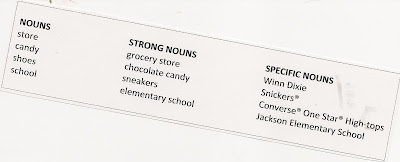Word Up!
Monday, January 24—Strong and Specific Nouns
Word choice is at the heart of good story telling. A single word can spark imagination, create an image, or evoke a feeling. We’re spending this week immersed in words. (No doubt, we ‘ll come back to this subject on down the line.) Barry Lane says, “Strong writing is built on nouns and verbs, not adjectives and adverbs.” (Reviser’s Toolbox by Barry Lane, p.54.) Let’s start off the week with nouns.
You know that the specificity of the noun chosen can change a sentence. As an example, consider this sentence:
Sarah lived in a house.
Now reread the sentence substituting each of the following nouns in place of the word house:
shack
mansion
hovel
palace
tenement
By simply changing the noun you can create setting, give immediate insight into some qualities of the character, or set the tone for a story.
Picture nouns on a continuum: Nouns--Strong Nouns--Specific Nouns. Good stories spend a lot of time in the Strong Nouns and Specific Nouns categories. Every noun in a story can't be made strong or specific, but our goal should be to dial up the quality of every noun that could possibly make our writing more specific. Ok, ok, you’re saying, “What in the world is he talking about?” I can probably show you more easily than tell you with the following examples.
Some nouns don’t have a strong “version”, but skip directly to being specific.
BEWARE of Pronouns!
Student writers are notorious for writing sentences like this:
He went there to search for the stuff he needed for his work.
Immediately you wonder: Who is he? Where is there? What stuff? What kind of work? That’s the dreaded pronoun at work. Using strong and specific nouns would help the sentence read:
Twan went to Home Depot to buy lumber and acrylic paints for his Pinewood Derby race car.
Students aren’t the only writers who have an addiction to pronouns. If you see those pesky pronouns in your writing, make sure you aren’t leaving your reader with unanswered questions!
A Final Word
The next time you’re writing, think about the nouns you are using. Are they strong? Specific? As you make your nouns more powerful you will also being your your writing more specific.
IT’S YOUR TURN!
IT’S YOUR TURN!
1. Divide a sheet of paper into three columns. Label the columns: Nouns, Strong Nouns, Specific Nouns. Look over a piece of your writing, circle all the nouns, and then list each noun in the appropriate column on the chart. Do your nouns fall more in one category than another? Circle the nouns on your list that you want to make stronger or more specific. (Note: An excellent resource every writer needs is Children’s Writer’s Word Book by Alijandra Mogilner. Better than a thesaurus, this book helps you see synonyms appropriate for various ages of kids.)



No comments:
Post a Comment